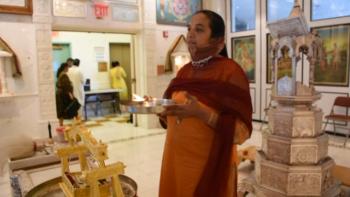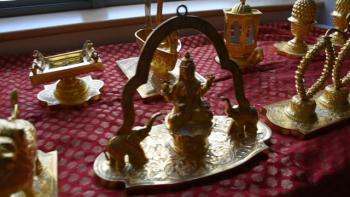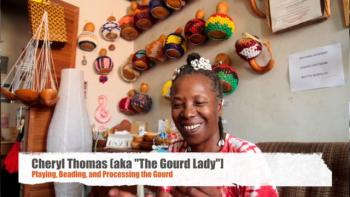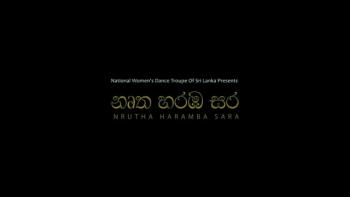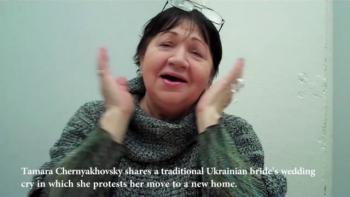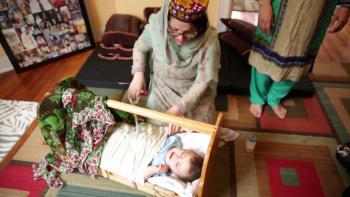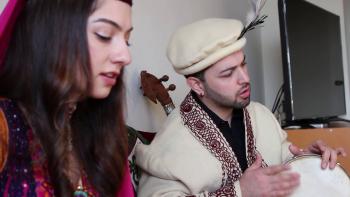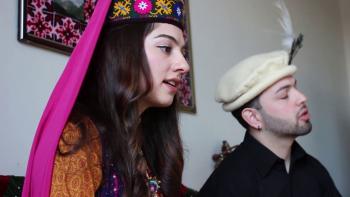Browse Digital Heritage
Aarti also spelled arti, arati, arathi, aarthi (In Devanagari: आरती ārtī) is a Hindu religious ritual of worship, a part of puja, in which light from wicks soaked in ghee (purified butter) or camphor is offered to one or more deities. Aartis also refer to the songs sung in praise of the deity, when lamps are being offered.
Ritual
Place
Health
Material Culture
Migration
Music
Belief
This notion that “all Jains are Gujaratis” is overshadowing the true representation of who Jains are and the religion Jainism. As part of Brooklyn Arts Council's Citizen Folklife initiative, Smrita Jain does fieldwork in order clear up this misconception.
Ritual
Place
Health
Material Culture
Migration
Music
Belief
Cheryl "The Gourd Lady" Thomas discusses her dedication to the tradition of gourd making and playing.
Material Culture
Music
Pahim Path Mangalya production by the National Dance Troupe of Sri Lanka on Staten Island in August 2014.
Ritual
Dance
Tamara Chernyakhovsky shares a traditional Ukrainian wedding cry sung by a bride before her marriage in which she protests her move from home.
Verbal Arts
Ritual
Music
At home in Brooklyn, thousands of miles from the Hunza Valley of northern Pakistan, Amina Bibi passes on the Wakhi language to her 1-year-old son Alhan - through lullabies. In Wakhi with Wakhi and English subtitles by Husniya Khujamyorova. Part of the Lullabies of New York Project, supported by the Brooklyn Arts Council.
In the second video, Jamila Bibi, a Wakhi speaker from the Gojal Valley in the Hunza District of northern Pakistan, tells the story of her family and her language. In Wakhi with Wakhi and English subtitles by Husniya Khujamyorova.
Verbal Arts
Music
Mirgulova Shirmo, a Rushani speaker originally from Vamar in the Rushan region of Tajikistan, sings a Rushani lullaby. In th second video, she discusses the lullaby and its wider context in her life. Part of the Lullabies of New York Project, supported by the Brooklyn Arts Council. In Rushani with Rushani and English subtitles by Husniya Khujamyorova.
Verbal Arts
Music
Fashion Designer Daniel "Dapper Dan" discusses the development of african american fashion during the birth of hip hop.
Material Culture
Wakhi speaker Rahila Babar, originally from Upper Hunza in Pakistan but now living in New York, sings a famous Wakhi song, accompanied by musician Shahid Ahmed Khan.
Music
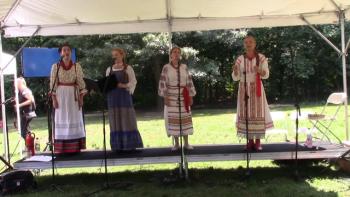
"Slava Tebye Bozha (Glory to You Lord)" - a call-and response field song ending in a wedding ceremony. Valentina Kvasova adds to the description in an interview at Brooklyn Arts Council
Music
Wakhi speaker Rahila Babar, originally from Upper Hunza in Pakistan but now living in New York, sings a Khowari song, accompanied by musician Shahid Ahmed Khan
Music
Search
Tradition
- Music (49) Apply Music filter
- Material Culture (30) Apply Material Culture filter
- Ritual (20) Apply Ritual filter
- Place (15) Apply Place filter
- Foodways (14) Apply Foodways filter
- Verbal Arts (14) Apply Verbal Arts filter
- Belief (13) Apply Belief filter
- Dance (11) Apply Dance filter
- Occupation (10) Apply Occupation filter
- Migration (6) Apply Migration filter
- Health (4) Apply Health filter
- Games (1) Apply Games filter
Collection
- Survive, Remember, Thrive: Armenian Traditions in Western New York (9) Apply Survive, Remember, Thrive: Armenian Traditions in Western New York filter
- Brooklyn Folk & Folk Artists Series (7) Apply Brooklyn Folk & Folk Artists Series filter
- The Non-Gujarati Jains (5) Apply The Non-Gujarati Jains filter
- Freeport Waters (4) Apply Freeport Waters filter
- Lullabies of New York (4) Apply Lullabies of New York filter
- Superstorm Sandy (4) Apply Superstorm Sandy filter
- NYSCA-New York Folklore Upstate Regional Initiative (3) Apply NYSCA-New York Folklore Upstate Regional Initiative filter
- Heritage Ambassadors (2) Apply Heritage Ambassadors filter
- Made of Thunder, Made of Glass II (2) Apply Made of Thunder, Made of Glass II filter
- New York City Beatz Coronavirus (2) Apply New York City Beatz Coronavirus filter
- Instructional Materials (1) Apply Instructional Materials filter
- North Country Heritage Awards (1) Apply North Country Heritage Awards filter
Community
- Brooklyn Arts Council (28) Apply Brooklyn Arts Council filter
- Castellani Art Museum of Niagara University (16) Apply Castellani Art Museum of Niagara University filter
- City Lore (11) Apply City Lore filter
- Long Island Traditions (9) Apply Long Island Traditions filter
- Arts Westchester (7) Apply Arts Westchester filter
- Endangered Language Alliance (6) Apply Endangered Language Alliance filter
- The Arts Council of the Southern Finger Lakes (6) Apply The Arts Council of the Southern Finger Lakes filter
- New York Folklore (5) Apply New York Folklore filter
- Staten Island Arts (4) Apply Staten Island Arts filter
- Traditional Arts Upstate New York (4) Apply Traditional Arts Upstate New York filter
- Esraa Warda (3) Apply Esraa Warda filter
- GO Art (3) Apply GO Art filter
- Brooklyn Public Library (2) Apply Brooklyn Public Library filter
- Center for Traditional Music and Dance (2) Apply Center for Traditional Music and Dance filter
- New York State Old Tyme Fiddlers' Association (2) Apply New York State Old Tyme Fiddlers' Association filter
- The Folklife Center at Crandall Public Library (2) Apply The Folklife Center at Crandall Public Library filter
- Mind-Builders Creative Arts Center (1) Apply Mind-Builders Creative Arts Center filter
Culture
- United States (11) Apply United States filter
- Armenia (9) Apply Armenia filter
- India (8) Apply India filter
- African-American (5) Apply African-American filter
- China (4) Apply China filter
- Finland (4) Apply Finland filter
- Pakistan (4) Apply Pakistan filter
- Tajikistan (4) Apply Tajikistan filter
- American (3) Apply American filter
- Haudenosaunee (3) Apply Haudenosaunee filter
- Mexico (3) Apply Mexico filter
- Paraguay (3) Apply Paraguay filter
- Puerto Rico (3) Apply Puerto Rico filter
- Trinidad and Tobago (3) Apply Trinidad and Tobago filter
- Dominican Republic (2) Apply Dominican Republic filter
- Morocco (2) Apply Morocco filter
- Russia (2) Apply Russia filter
- Ukraine (2) Apply Ukraine filter
- Uzbekistan (2) Apply Uzbekistan filter
- Algeria (1) Apply Algeria filter
- Arab (1) Apply Arab filter
- Bhutan (1) Apply Bhutan filter
- Canada (1) Apply Canada filter
- Gambia (1) Apply Gambia filter
- Ghana (1) Apply Ghana filter
- Guinea (1) Apply Guinea filter
- Guinea-Bissau (1) Apply Guinea-Bissau filter
- Guyana (1) Apply Guyana filter
- Ireland (1) Apply Ireland filter
- Israel (1) Apply Israel filter
- Italy (1) Apply Italy filter
- Japan (1) Apply Japan filter
- Korea, South (1) Apply Korea, South filter
- Lebanon (1) Apply Lebanon filter
- Mohawk Nation at Akewesasne (1) Apply Mohawk Nation at Akewesasne filter
- Mongolia (1) Apply Mongolia filter
- Nigeria (1) Apply Nigeria filter
- Onöndowa’ga:’ (Seneca) (1) Apply Onöndowa’ga:’ (Seneca) filter
- Peru (1) Apply Peru filter
- Sri Lanka (1) Apply Sri Lanka filter
- Turkey (1) Apply Turkey filter

